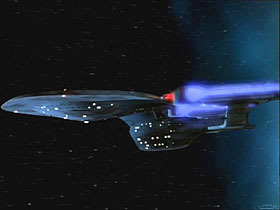To boldly read what no service chief has recommended before: Thoughts on sci-fi

By Michael Clauser
Best Defense guest literary critic
Want to think
about the future? Try science fiction. The scientists, engineers, and
mathematicians only come after to solve the inevitable technological challenges
posed first by the writers.
After all, it was
Jules Verne's Twenty Thousand Leagues Under the Sea (1870) that
envisioned the submarine and his From the Earth to the Moon (1865) that
articulated a coherent vision for space travel. Mary Shelley's Frankenstein
(1818) suggested the interoperability and regeneration of body parts (BTW: Are
you an organ donor?). What are the iPhone or Android smartphones other than
early attempts at the "tricorder" from Gene Rodenberry's Star Trek (1966)? Speaking of androids, Karel
Capuk's R.U.R. (1920) introduced the very word "robot" into the English
lexicon -- though today we call the type that flies over certain countries
"drones" and the type that sweeps your floors Roombas. H.G. Wells's The War
of the Worlds (1897) featured a "heat ray" weapon, well before Boeing's YAL-1
Airborne Laser or Raytheon's Active Denial System. The recent controversy over the NSA's bulk collection of telephone
metadata has engendered comparisons to George Orwell's dystopian 1984 (1949). Big data makes the Nest thermostat self-learning, though
not self-aware -- yet -- but when the glowing red circle does, it
might rename itself "HAL" from Arthur C. Clarke's 2001: A Space Odyssey
(1968).
If science fiction
literature is so vital to pushing the envelope on "what could be" in future
technological advances, why does the genre feature so dismally in the myriad
military reading lists published by Pentagon brass? In fact, the number of
science-fiction books -- if
they appear -- barely number more than the number of Harlequin romances. Look
for yourself:
Chairman Joint Chiefs of Staff List
Army Chief of Staff List 2014
Marine Corps Commandant's Professional Reading List 2013
Chief of Naval Operations Professional Reading Program
Air Force Chief of Staff Reading List 2013
When science
fiction does appear on service chiefs' reading lists, it's usually Robert
Heinlein's Starship Troopers (1959) or Orson Scott Card's Ender's Game
(1985), two volumes that present stark, stylized, and idealized notions of
leadership, statesmanship, strategy, or virtue useful for leadership development.
Both are stellar works -- as are Frank Herbert's Dune (1965) and Isaac
Asimov's Foundation (1942) -- two of my favorites. But the technological
speculation in these books, like their futuristic settings, is secondary to
their narratives on leadership and strategy.
This leaves the
question: Which works of contemporary science fiction should young military
officers read for a glimpse into the future of military technology? If drones,
cyber, biotech, nukes, lasers, subs, and commercial space travel are all now --
then what's next? Invisibility? Nanite warfare? Cyborgs? Teleportation?
Telekinetics? Time travel? Cryogenics? What science-fiction predictions of
today would make even DARPA giggle?
One colleague
suggested titles like Jon Scalzi's Old Man's War (2007), Joe Haldeman's The Forever War (2012), Charles Stross's Accelerando (2005), Ian MacDonald's The
Dervish House (2010), and Mark
Jacobsen's Lords of Harambee (2012). Another suggested Alas, Babylon (2013) by Pat Frank, Nevil Shute's On
the Beach (2010), A Canticle for Liebowitz (1984) by Walter M. Miller, and The Sten Series (2010) by
Allan Cole and Chris Bunch.
Unable to vouch
for many of these myself, I leave it up to readers of the Best Defense to
suggest today's science fiction titles for tomorrow's military technology. What do you
think?
Michael Clauser works in tech, but sure didn't
major in science, technology, engineering, or mathematics at Penn State. He
served in the administration of George W. Bush in the Pentagon, on Capitol
Hill, and is an officer in the U.S. Navy Reserve. He thanks his Dad for
introducing him to science fiction at a young age. The views and opinions of
the author expressed herein do not necessarily state or reflect those of the U.S.
Navy, the U.S. Government, or Starfleet Command.
Thomas E. Ricks's Blog
- Thomas E. Ricks's profile
- 436 followers



